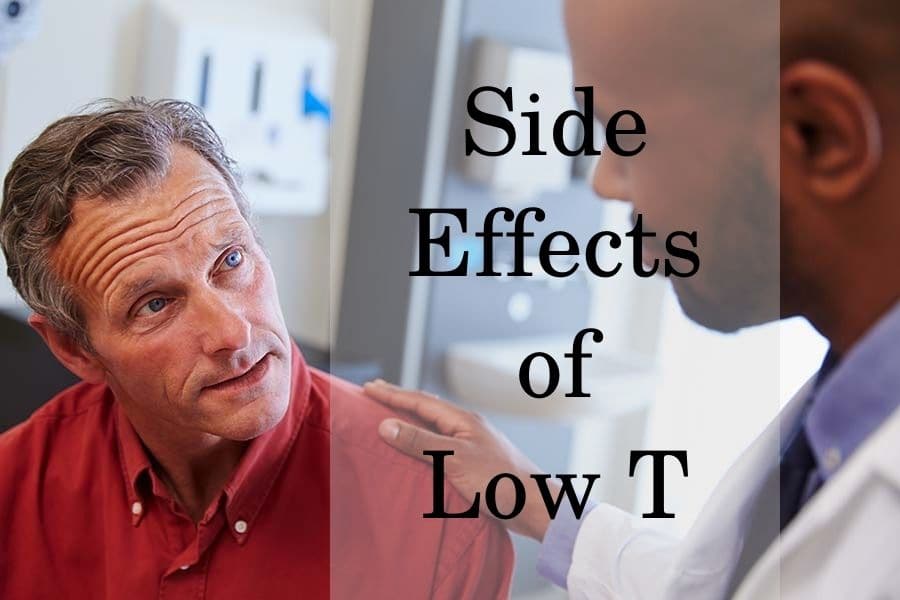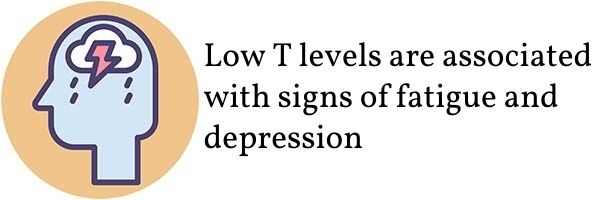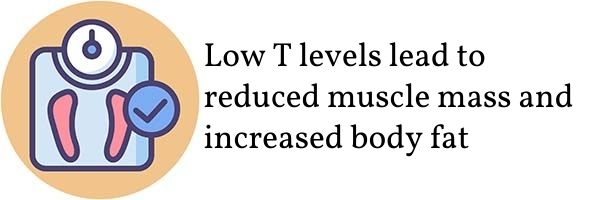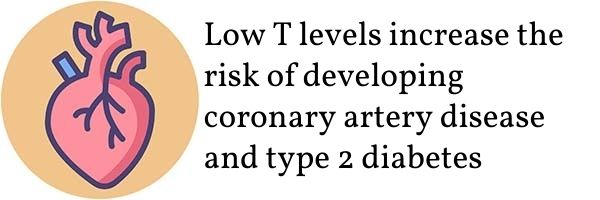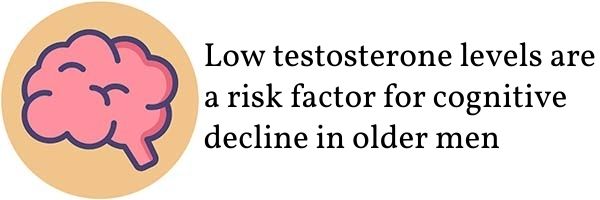Testosterone deficiency is a medical condition occurring when your body can no longer produce sufficient amounts of the male sex hormone.
It involves a rapid decline in your hormonal levels in combination with symptoms of low testosterone (T). The hormonal imbalance and the presence of symptoms set the condition apart from the natural age-related decline of T by 1-2% a year.
Testosterone deficiency, also known as hypogonadism, can be caused by various factors, including infection, trauma, tumors, genetic factors, and medications affecting the testicles or other glands such as the pituitary that control testicular function.
In this article, you will learn more about the debilitating symptoms of this condition and its long-term risks if left untreated.
If you have any symptoms, visit a doctor who can diagnose you and prescribe testosterone therapy. This type of treatment is highly effective for managing low T, and you will start noticing improvement as soon as the first month.
How to tell if you have low T?
The most commonly reported symptom amongst men with low T is the loss of libido, which is often accompanied by erectile dysfunction.
Less specific but also quite common symptoms include chronic fatigue, depressed mood, osteoporosis, loss of muscle mass and strength, and body fat gain.
Furthermore, many men with low T may be completely asymptomatic.
For example, a study of 1475 Afro-American, Hispanic, and Caucasian males reported that the prevalence of men with low T but no symptoms reached more than 47% in certain age groups (50yr+).
It is estimated that by 2025 there will be 6.5 million men with low testosterone in the US
The scientists also report that the prevalence of low T increases with age, but there is no difference in the incidence amongst the ethnic and racial groups included in the study.
Also, men with symptomatic low T are more likely to have obesity, low physical activity, chronic conditions, and unhealthy habits such as smoking.
Loss of libido and erectile dysfunction is usually the first combination of symptoms that men may experience due to testosterone deficiency. It is crucial to distinguish low T from other conditions that are also common causes of erectile dysfunction – atherosclerosis, anxiety, and depression.
The best way to differentiate the condition from other chronic diseases is to measure your serum testosterone levels. Your doctor may assign you several tests to confirm the diagnosis.
Low T is often accompanied by unspecific symptoms such as fatigue, depressed mood, and weight gain. In some cases, they may be the only manifestation of the condition.
Less than 10% of men with low T receive treatment
This is why testosterone deficiency often remains underdiagnosed and undertreated. Research reports that less than 10% of the affected men receive treatment. If left untreated, the condition can cause debilitating symptoms and reduced quality of life.
Mental side effects of low T
Studies report that men with low T are more likely to experience symptoms of depression and anxiety.
That is likely because the hormone modulates the GABA and serotonin receptors in the human brain. These neurotransmitters regulate a wide range of brain functions, including mood and emotions.
In fact, low T appears to be quite common amongst men with depression. This is why it’s also recommended to consider measuring testosterone levels and screening for testosterone deficiency in some subpopulations of men with depression, especially those with major depressive disorder.
On the other hand, mood swings such as sudden changes from depression to mania and vice versa are more common in men with significant fluctuation in T levels, such as those abusing anabolic steroids.
More on: How Low Testosterone Affects Mental Health
Sexual side effects of low T
Testosterone has complex effects on male sexual function. It stimulates libido and arousal but also regulates the activity of various enzymes that control both the initiation and the cessation of a penile erection.
That’s why men can have low T without having erectile dysfunction levels and vice versa. Yet, the lack of libido caused by testosterone deficiency significantly increases the risk of problems with achieving and maintaining an erection.
In addition, if your testes can no longer produce testosterone, it will also lead to infertility. That is because intratesticular testosterone levels are vital for the production of viable sperm.
More on: How Low Testosterone Affects Fertility
Low testosterone levels during adolescence can also lead to reduced penis size since adequate T levels are essential for penile growth in that period. Yet, developing testosterone deficiency after puberty is not likely to lead to penile atrophy or shrinkage.
Physical side effects of low T
Testosterone deficiency can lead to several physical changes in your body:
- loss of muscle mass and strength
- body fat gain
- lack of energy
- enlarged breast tissue
- drier skin
- reduced bone mineral density and osteoporosis
Normal testosterone levels are anabolic for muscle and bone tissue and catabolic for fatty tissue. This is why patients with testosterone deficiency experience negative body composition changes such as muscle loss, body fat gain, and obesity.
More on: How Low Testosterone Causes Weight Gain
The loss of muscle mass is often accompanied by declining strength and energy levels. Some patients with low T even report falling asleep right after dinner due to the excessive fatigue and lethargy that they experience.
More on: How Low Testosterone Makes You Tired
On the other hand, obesity increases the activity of an enzyme called aromatase which converts the remaining testosterone into estrogen.
Therefore, low T can also lead to an imbalance between testosterone and estrogen levels and the relative prevalence of estrogen. Estrogen can trigger the receptors in the male breast tissue and stimulate its enlargement, leading to gynecomastia.
Cardiovascular side effects of low T
Low testosterone levels can lead to increased build-up of fat around your waist and internal, which has a negative impact on your metabolic and cardiovascular health.
This type of adiposity is called visceral, and it is a risk factor for high blood pressure, insulin resistance, hypercholesterolemia, and heart disease.
The increased insulin resistance can progress to type 2 diabetes in genetically predisposed individuals.
Furthermore, the increased cholesterol levels can speed up atherosclerosis and raise the risk of potentially fatal conditions such as stroke or heart attack.
Cognitive side effects of low T
The brain has androgen receptors for testosterone, which help regulate male sexual behavior but also affect sleep and cognition.
In fact, low T has a negative effect on the cognitive abilities in men and may lead to symptoms of brain fog and memory problems. Lower T levels in older men are correlated with cognitive decline in men without dementia.
Furthermore, several studies have reported that men with testosterone deficiency are more likely to develop dementia such as Alzheimer’s.
In the most severe cases of testosterone deficiency, patients may also experience sleep problems, including insomnia.
More on: How Low Testosterone Causes Sleep Problems
Men with low T and obesity may also experience sleep apnea which is a condition that leads to a shortage of oxygen during sleep and a decline in sleep quality. Unfortunately, patients with severe sleep apnea are not suitable for testosterone therapy as the condition may worsen.
Migraines and headaches are rare symptoms of low T in men, and they can also be caused by stress and lack of sleep due to hypogonadism.
Long-term side effects of low testosterone
If left untreated, long-term testosterone deficiency may lead to severe disability and an increased risk of premature death.
Without the anabolic effects of testosterone, you will progressively lose bone mineral density which eventually causes osteoporosis and an increased risk of bone fractures. In older individuals, bone fractures can lead to prolonged hospital stays and permanent disability.
More on: What Pain Can Low Testosterone Cause?
Men taking testosterone have a 39% reduction in mortality risk
The American Urological Association also warns that men with low T are more likely to suffer from heart attack and other potentially fatal complications. Mortality in untreated men is twice as high compared to those receiving appropriate testosterone therapy.
Low T and the comorbidities which occur as a result can also lead to reduced quality of life and increased healthcare costs. One study in the UK reported that testosterone treatment reduces the economic burden on managing comorbidities in untreated men by £3732 (almost $5000). The majority of these costs are for treating the cardiovascular complications of low T.
Get a free consultation with our medical expert for any questions about hormone replacement therapy

